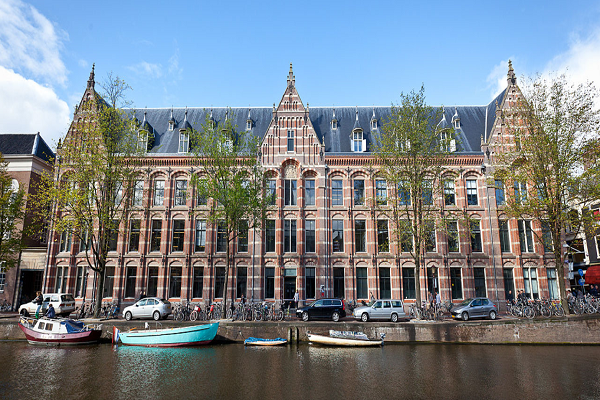University of Amsterdam: Solving complex social problems with data from Statistics Netherlands
A digital twin of society that policymakers can use to solve complex social problems: that sounds futuristic. Yet this is exactly what researchers from Statistics Netherlands (CBS) and the University of Amsterdam (UvA), in particular the Institute for Advanced Study (IAS), are working on. On 31 May of this year, the fruitful cooperation between Statistics Netherlands and the UvA was extended for five years.
We live in a world of complex systems: everything is connected to everything else. The economy, the environment, social security, how people move in their network of friends, colleagues and acquaintances, there are many factors that determine how these systems develop and the systems also influence each other. Since 2019, researchers from CBS and IAS have been jointly investigating this complexity and trying to get a grip on complex problems such as climate change and inequality of opportunity.
Grip on complexity
The cooperation has two goals. ‘First, we want our research to contribute to solving complex social problems – also known as wicked problems – such as the poverty trap and the energy transition,’ says Prof. Huub Dijstelbloem, director of IAS. ‘Secondly, the cooperation between IAS and CBS contributes to a better understanding of complexity as a method. We are particularly interested in the relationship between the various complex systems, for example environment, poverty and inequality. The goal is to develop a better method to investigate these systems and to get a better grip on them, so that policy makers can make targeted improvements.’
Digital twins
In recent years, much research has been conducted into so-called digital twins. CBS researcher Gert Buiten: ‘You can study complex systems by making a digital copy of reality. You build a so to speak, Dutch society and add agents that represent the inhabitants of the Netherlands. The behaviour of these agents can be modelled and then, with the press of a button, you can run various scenarios and see what happens. Dijstelbloem: ‘Policymakers can make use of these digital twins when making targeted improvements to society. From a simulation in a digital version of society, you could derive early warning signals and test options for new policy, for example. There are many ethical and privacy considerations involved in this way of doing research. CBS researcher Edwin de Jonge: ‘That has our continuous attention. We ensure privacy by design: the design of our models has the privacy guarantee embedded.’
Mapping networks
The next step is for CBS and IAS to investigate networks of relationships between people. Based on information in government registers, CBS has mapped the relationships of the Dutch population in a completely anonymous manner. De Jonge: ‘This concerns family relationships, who live together with whom, who knows each other from work, who are friends and who went to school together. This database has already been used to study the extent to which highly educated Dutch people have contact with lower educated Dutch people, while guaranteeing their privacy. In addition, the network has been used to calibrate scientific models about the distribution of corona and to make them as realistic as possible. Buiten: ‘Researchers call this a unique database. Together with the IAS, we are going to think up more applications for it in the years to come. We are also working with Leiden University with whom we have formed a consortium, Population-Scale Network Analysis (POPNET), to realise a secure user interface for the database so that researchers, including those from planning agencies and ministries, can use it under strict conditions.
Making a public story
Dijstelbloem also stresses that he wants to contribute to ‘the narrative’: ‘If problems are really complex, such as with climate change or the coronapandemic, then you often see that developments are not linear. The situation does not gradually get worse, but can suddenly escalate or there can be a ‘point of no return’. That means you have to act before it is too late. This means that a government has to take measures that go against people’s intuition, such as the coronation measures. Then you have to convince people, make them realise that they are doing something for the greater good, for society as a whole. The IAS is keen to help do that in a good way, by thinking together with politicians and policy-makers about how to explain things in a way that is clear enough.’
Bursting enthusiasm
A workshop was organised around the signing of the extended cooperation in which the researchers shared new ideas and plans. Buiten: ‘There is a lot of enthusiasm among the researchers. It is a vibrant atmosphere.’ Dijstelbloem: ‘To give you an example: in the coming period we will be focusing on the subject of polarisation. With the help of demographic and economic data from the CBS, among others, we want to gain more insight into this. Where do people with more extreme views live, for example, how are they distributed on the labour market? We are now doing this with the help of surveys, for example at schools. But we want more: that is why we are now researching how we can better map out this complex social phenomenon.’
Combining theory and practice
‘At the same time, we are continuing to build the digital twins of Dutch society in which agent-based models are combined with our network database’, says De Jonge. In order to secure the computing power required for such a comprehensive system, CBS is working with CERN in Switzerland. Buiten: ‘We combine their computing power with our data from practice and the mathematical models of the IAS. That offers fantastic possibilities. You can compare it to the James Webb telescope: our models let you look at the world in a way that was not possible before. This leads to new theories and new scientific insights and hopefully to a solution for our biggest social problems.’

